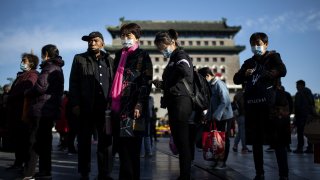
- Lower-income groups have been hit particularly hard by a slowdown in household income growth, says Barclays Asia Pacific's Jian Chang.
- Consumer spending in China has largely lagged the country's overall economic recovery from the pandemic.
- Barclays economists said in a Wednesday note they do not see growth in China's consumption and services returning to pre-Covid levels this year.
Consumer spending in China has largely lagged the country's overall economic recovery from the pandemic and that sluggishness stems from slower household income growth, according to Jian Chang, chief China economist at Barclays Asia Pacific.
Data released Wednesday showed China's retail sales once again missed analyst expectations. Official data reported retail sales rose 12.4% in May from a year ago, less than the 13.6% increase forecast by analysts.
Get South Florida local news, weather forecasts and entertainment stories to your inbox. Sign up for NBC South Florida newsletters.
Barclays economists said in a Wednesday note they do not see growth in China's consumption and services returning to pre-Covid levels this year.
"A fundamental issue, I think, that has been holding back the Chinese consumer spending is really the … slower household income growth, and particularly for lower income group," Chang told CNBC's "Squawk Box Asia" on Friday.
Money Report
In 2020, China's cash-strapped poor took on more debt after the pandemic hit job prospects.
Chang pointed to comments from Premier Li Keqiang last year in which he said roughly 600 million people earn just 1,000 renminbi per month (about $155).
She noted that migrant worker salaries have also struggled to recover, posting growth of just 2.5% as compared with 6.5% pre-pandemic.
These are headwinds for Beijing as the Chinese government hopes to promote its "dual circulation" policy, which places greater emphasis on consumption as a key economic driver.
"To improve household consumption share in the GDP you really need to improve household income share in the GDP," Chang said.
"That means you really need to improve income distribution … which we know that is quite difficult, especially after the global financial crisis and after the pandemic. We really see globally, you know, there is the widening of income gap and the widening of wealth gap," she said.
Chang said there's also a gap in where spending occurs. While larger stores and shopping malls have been "quite strong," Chang said smaller stores are not seeing the same performance.
"If you look at the smaller store sales, which accounts for two-thirds of overall retail sales, that has really been underperforming and is not even half of its growth rate pre-pandemic," Chang said.
— CNBC's Evelyn Cheng contributed to this report.






